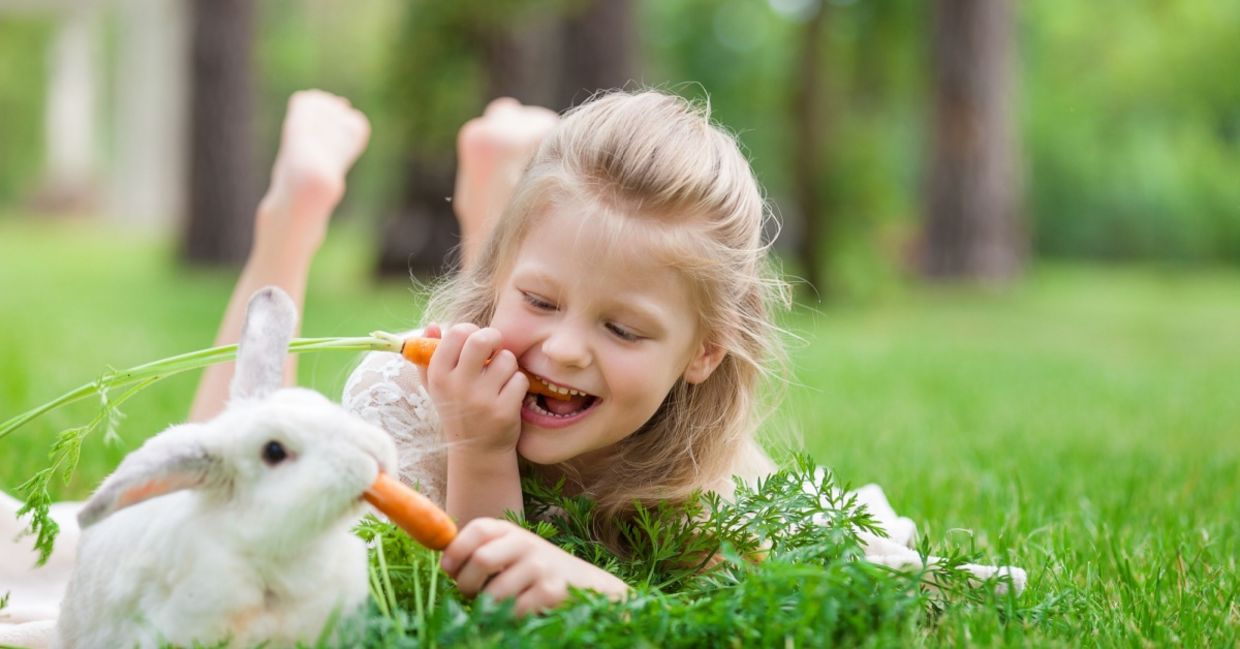
(SunKids / Shutterstock.com)
The saying goes that a dog is “man’s best friend,” but this companionship isn’t unique to canines. Even though they are smaller and quieter than dogs, rabbits are also intelligent, outgoing, active, and social and they make great pets. In fact, according to Rabbit.org rabbits are the third most common pet choice, coming in just after dogs and cats, and they are the most popular small animal pet in the United States
Why do one and half million American households choose to keep rabbits as pets? There are a number of reasons why bunnies are the ideal companion, from their cleaning habits to their behavior to their care routines. Here are five reasons to adopt a bunny today.
Rabbits reduce emissions
According to the Washington Post, bunnies make a green pet option. The Post reports that pet food is responsible for nearly two percent of emissions from agriculture. If it was a country, pet food manufacturing would rank as number 60 in terms of global emissions.
That’s largely because dog and cat food (the two most popular pets) is protein-dense and made from livestock, which is one of the major sources of agricultural emissions. This is especially the case when it comes to “premium” pet food, produced from human-grade meat.
By contrast, rabbits eat mostly hay, and a few vegetables, all of which require a much smaller environmental footprint to produce. Plus, El Cerrito mayor and proud bunny mom, Tessa Rudnick, reports, the veggie diet has improved her own family’s health as well. “It forces us to always have fresh food in the house,” she told the Washington Post. “We’re definitely eating a lot more kale.”
Rabbits are budget-friendly
According to the Washington Post, rabbit care is significantly less expensive than the budget required for taking care of a dog or cat. It costs about $50 monthly to feed and care for a bunny, and they also require less veterinarian checkups than larger animals.
It’s easy to fit a bunny into the schedule
The Petfinder organization shares that rabbits are crepuscular animals, which means they are awake in the early morning and early evening, and spend most daytime and nighttime hours sleeping. This works well for someone with a typical day job schedule.
For 9-5ers, the bunny is ready for playtime in the morning before work and after getting home from work, and the employee doesn’t need to feel guilty about leaving the rabbit home during the daytime hours, because it spends those hours snoozing away. And, a rabbit requires less care time, since there’s no need to take it for daily walks, so it’s a great option for a busy pet-lover.
Bunnies are clean, quiet, and contained
VetStreet adds that rabbits are clean animals that generally don’t make large messes and clean up after themselves. It’s easy to litterbox train a rabbit and they groom themselves. Rabbits don’t require as large living spaces as a dog or cat does, so they are apartment-friendly. Also a plus for apartment dwellers, rabbits don’t bark or make loud noises, so they won’t bother the owner or the neighbors.
Bunnies are intelligent and adorable
VetStreet adds that bunnies, like dogs, are smart enough to be trained to do all sorts of tricks. They are also affectionate and friendly. Rabbits quickly come to recognize their owners and will follow them around the house and show them all sorts of love. They love to be pet and crave attention (although they don’t like being picked up.
Someone who wants to become a rabbit mom or dad, should look into rabbit rescue, since according to PetFinder, they are the third-most surrendered pet. Additionally, PetFinder cautions that owning a rabbit still requires major time and space commitment and people should make sure they are ready for the responsibility before adopting.
But, those who have successfully adopted a pet rabbit often grow to love their buns and see them as a part of the family. Mayor Rudnick tells Washington Post that her bunny, Willow, has bonded strongly with her eight-year-old daughter, Shira. Shira agrees, telling the Post that no matter what, they can always be a good part of the family.”
YOU MIGHT ALSO LIKE:
Science Says Pet Parents are Happier
7 Health Benefits of Living With Pets
5 Ways Kids Who Grow Up With Pets Are More Emotionally Intelligent







